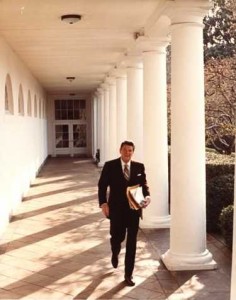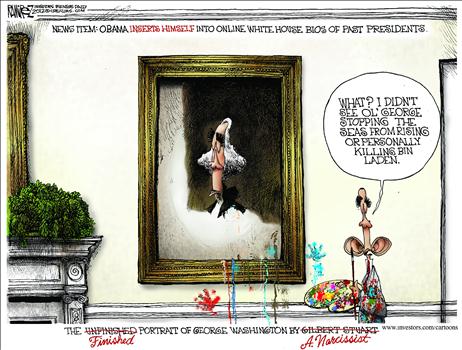Policies, as essential as they are, aren’t the only consideration when choosing leaders. Character is of equal significance. One of the key traits I seek in a candidate is humility. Pride is the cause of untold miseries. An arrogant leader is prone to mistakes based on his unrealistic evaluation of his own personal importance. What really gets to me are the polls that show a majority of Americans think Obama is likeable. Since when?
This is the man who wrote his autobiography in his early thirties. Who does that? This is the man who served only two years in the Senate, but who spent most of that time running for president. He has no legislative credentials during that tenure. This is also the man who declared that his election would signal the healing of the planet and the lowering of the oceans. Is there any greater indication of arrogance?
Then last week we were treated to the spectacle of the biographies of presidents on the White House website having been altered. Did you miss that one? Most of the twentieth-century presidents had a comment or two added about Obama. Huh? What did Obama have to do with FDR, Truman, JFK, LBJ, or Reagan? It was a bald attempt to insert his “accomplishments” into the stories of earlier administrations. Fortunately, it has met with the ridicule it deserves:
A narcissist is someone who is overly self-involved, and often vain and selfish. For the narcissist, the world revolves around him, his thoughts, and his deeds. I would say the cartoonist captures the essence of our current president.
 What a contrast can be provided by looking at Ronald Reagan. He brought the nation out of the depths of economic despair and followed policies that led ultimately to the dismantling of the “evil empire,” the Soviet Union. Yet one seeks in vain for any comment from Reagan boasting about his accomplishments. On the economy, whenever anyone tried to give him credit, he would say he simply got the government out of the way; it was the genius of individual entrepreneurs that created the turnaround. When the USSR collapsed, you didn’t see him taking a victory lap. Most of what he did to help bring about that collapse was behind the scenes.
What a contrast can be provided by looking at Ronald Reagan. He brought the nation out of the depths of economic despair and followed policies that led ultimately to the dismantling of the “evil empire,” the Soviet Union. Yet one seeks in vain for any comment from Reagan boasting about his accomplishments. On the economy, whenever anyone tried to give him credit, he would say he simply got the government out of the way; it was the genius of individual entrepreneurs that created the turnaround. When the USSR collapsed, you didn’t see him taking a victory lap. Most of what he did to help bring about that collapse was behind the scenes.
He also did little things that revealed his humility. Reagan had a pen pal in a Washington, DC, school. He visited the boy’s home a few times, but reporters never knew about it. It was something that came from his heart, not from cynical political advantage.
Then when Reagan realized he had Alzheimer’s, he wrote a letter to the American people—his final public utterance. I can imagine some would use this opportunity to focus on self, but again, Reagan had a different spirit. Here’s how that letter ended:
In closing, let me thank you, the American people, for giving me the great honor of allowing me to serve as your president. When the Lord calls me home, whenever that may be, I will face it with the greatest love for this country of ours and eternal optimism for its future. I now begin the journey that will lead me into the sunset of my life. I know that for America there will always be a bright dawn ahead.
How many of us, facing a future filled with lost memories and steadily decreasing mental capabilities, would concentrate instead on how grateful we are to have been allowed to serve? How many of us would be thinking more about our fellow citizens than ourselves? The humility that Reagan brought to the office of the presidency should be an inspiration to us all. It should also create within us a desire to see that kind of humility restored to that office.

